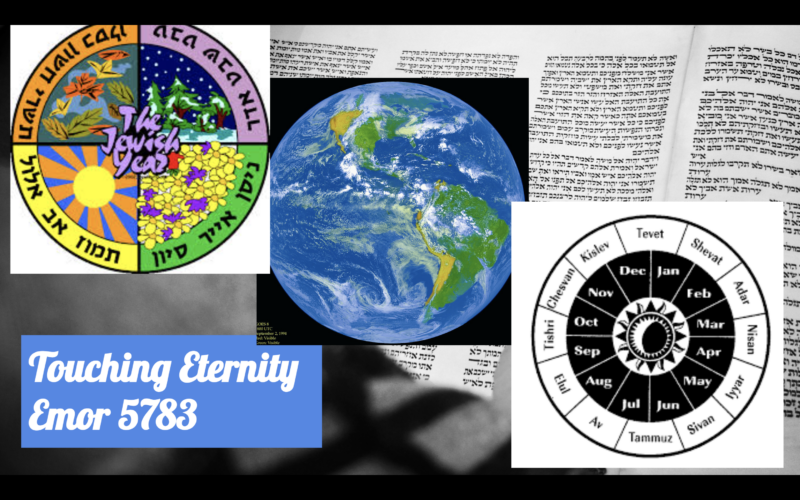
Touching Eternity: Emor 5783 / 2023
This week’s Torah portion, Emor, gives us a roadmap for the spiritual flow of the Jewish year. First is Shabbes. “On six days work may be done, but on the seventh day there shall be a sabbath of complete rest.” (Lev 23:3) Then comes Passover, the Feast of Unleavened Bread. Then the seven weeks of the Omer, the corridor of time we’re in right now. Then Shavuot on the 50th day, festival of first fruits.
Then Rosh Hashanah, a day of shofar blasts. Of Yom Kippur, Day of Atonement. Torah says, “וְעִנִּיתֶ֖ם אֶת־נַפְשֹׁתֵיכֶ֑ם ” — usually translated as “you shall practice self-denial,” though I prefer to read it as, “You shall answer your soul.” Four days later, Torah says, it’s time for Sukkot. Build a sukkah and live in it. Gather lulav and etrog. Rejoice before God for seven days, and the 8th day is a festival day too.
It’s an outline of the Jewish spiritual year. Every seventh day, we’re supposed to rest. Shabbat is first and foremost: the basic unit of Jewish time is six days of regular week and a seventh day of Shabbat. And then we move from liberation to revelation to gratitude. From spring harvest (Pesach) to summer harvest (Shavuot) to the Days of Awe and the fall harvest (Sukkot.) That’s the cycle of our year.
There are a few holidays that aren’t here. Tu BiShvat, the new year of the trees. Purim, festival of masks and merriment. Tisha b’Av, when the Temples fell. Chanukah. All of these are post-Biblical. They’re from the last couple thousand years, more or less. That makes them positively modern, by Jewish standards! Listed here are the oldest fixed points in the Jewish year, from antiquity to now.
This week’s Torah portion reminds me that our holidays aren’t wholly separate or discrete. The festivals are connected like pearls on a string. One leads to the next. Notice how the Omer draws a through-line connecting liberation at Pesach with revelation at Shavuot, or how Rosh Hashanah (shofar as spiritual alarm clock) sets up Yom Kippur (answering the call of our souls) which leads to Sukkot.
The festivals connect us with the earth: Passover and Shavuot and Sukkot are all harvest festivals, because in the Mediterranean climate where our tradition originated those are all times of year when things are growing. They connect us with the heavens, too: Pesach and Shavuot fall at full moon, Rosh Hashanah falls at new moon, and of course each week is half of the moon’s waxing or waning.
They connect us with community. In antiquity, the Shalosh Regalim / Three Pilgrimage Festivals (Pesach, Shavuot, and Sukkot) were times of coming-together as a community. Today the Days of Awe and Passover tend to be our big times of convocation. But whether it’s three times a year, or twice a year, or every week, these holy times are meant to be celebrated in community, as a community.
And they connect us with our obligation to take care of each other. This week’s Torah portion reminds us again that when we harvest, we must set aside grain for “the poor and the stranger,” for those who are marginalized. (Lev. 23:22) At Passover we remind ourselves “let all who are hungry, come and eat.” At Sukkot, in our rain-prone sukkahs, we rekindle awareness of homelessness and housing insecurity.
The earth, and the stars, and community, and taking care of each other: these are among the most enduring things there are. Empires come and go, and all of these are still here. An individual life has its ups and downs, and all of these are still here. Our festivals connect us with eternity. And I like to hope that even thousands of years from now, maybe orbiting some distant star, they always will.
So notice where we are in the year. Where are we coming from? Where are we going? Take heart in how the Jewish year connects us across both time and space — with our ancestors and our descendants, and with our fellow Jews everywhere. We’re part of something enduring. And may all of this galvanize us in taking care of each other, and of our world, and of our own spiritual lives: now and always.
This is the d’varling that Rabbi Rachel offered on Shabbat (cross-posted to Velveteen Rabbi.)




 https://www.sefiracreative.com/
https://www.sefiracreative.com/